Critical Criminology's Impact on Criminology: An Essay Analysis
VerifiedAdded on 2023/04/24
|7
|1707
|424
Essay
AI Summary
This essay delves into the realm of critical criminology, a 20th-century development that sought to rectify biases within traditional criminology and provide a more comprehensive understanding of crime. The essay's thesis centers on the contributions of critical criminology, particularly in light of Marxian, Feminist, and Post-Modern theories, while also contrasting it with traditional criminology to highlight its novel contributions. The essay outlines key theories, emphasizing the redefinition of crime and the importance of considering social contexts, class, gender, and race. It examines how critical criminology addresses real-world issues by championing minority rights and challenging power structures, as exemplified by feminist and postmodern perspectives. The essay concludes by highlighting the significance of critical criminology in providing a broader understanding of the social and psychological factors that contribute to crime, ultimately building upon the foundations laid by traditional criminology while offering a more profound and relevant analysis for the modern era.
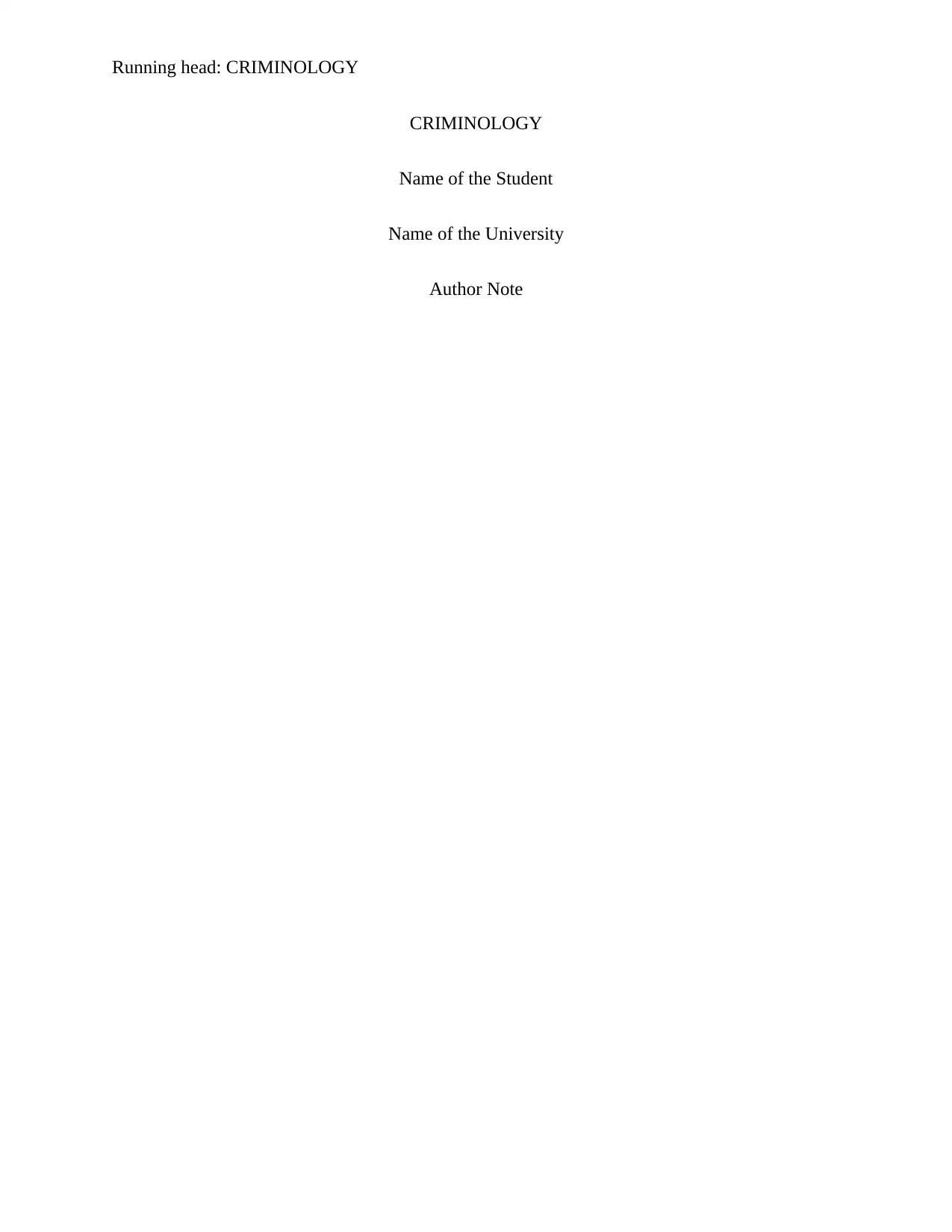
Running head: CRIMINOLOGY
CRIMINOLOGY
Name of the Student
Name of the University
Author Note
CRIMINOLOGY
Name of the Student
Name of the University
Author Note
Paraphrase This Document
Need a fresh take? Get an instant paraphrase of this document with our AI Paraphraser
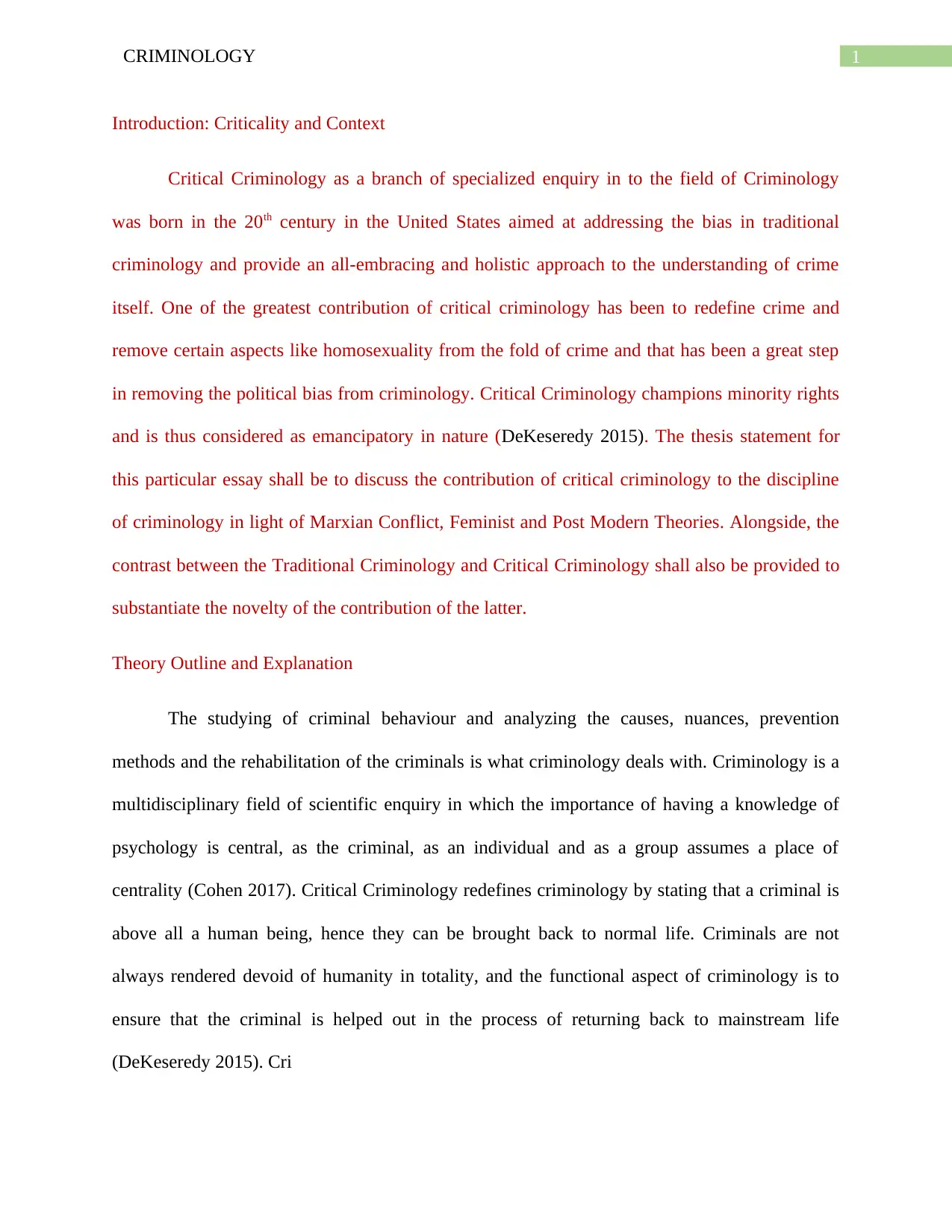
1CRIMINOLOGY
Introduction: Criticality and Context
Critical Criminology as a branch of specialized enquiry in to the field of Criminology
was born in the 20th century in the United States aimed at addressing the bias in traditional
criminology and provide an all-embracing and holistic approach to the understanding of crime
itself. One of the greatest contribution of critical criminology has been to redefine crime and
remove certain aspects like homosexuality from the fold of crime and that has been a great step
in removing the political bias from criminology. Critical Criminology champions minority rights
and is thus considered as emancipatory in nature (DeKeseredy 2015). The thesis statement for
this particular essay shall be to discuss the contribution of critical criminology to the discipline
of criminology in light of Marxian Conflict, Feminist and Post Modern Theories. Alongside, the
contrast between the Traditional Criminology and Critical Criminology shall also be provided to
substantiate the novelty of the contribution of the latter.
Theory Outline and Explanation
The studying of criminal behaviour and analyzing the causes, nuances, prevention
methods and the rehabilitation of the criminals is what criminology deals with. Criminology is a
multidisciplinary field of scientific enquiry in which the importance of having a knowledge of
psychology is central, as the criminal, as an individual and as a group assumes a place of
centrality (Cohen 2017). Critical Criminology redefines criminology by stating that a criminal is
above all a human being, hence they can be brought back to normal life. Criminals are not
always rendered devoid of humanity in totality, and the functional aspect of criminology is to
ensure that the criminal is helped out in the process of returning back to mainstream life
(DeKeseredy 2015). Cri
Introduction: Criticality and Context
Critical Criminology as a branch of specialized enquiry in to the field of Criminology
was born in the 20th century in the United States aimed at addressing the bias in traditional
criminology and provide an all-embracing and holistic approach to the understanding of crime
itself. One of the greatest contribution of critical criminology has been to redefine crime and
remove certain aspects like homosexuality from the fold of crime and that has been a great step
in removing the political bias from criminology. Critical Criminology champions minority rights
and is thus considered as emancipatory in nature (DeKeseredy 2015). The thesis statement for
this particular essay shall be to discuss the contribution of critical criminology to the discipline
of criminology in light of Marxian Conflict, Feminist and Post Modern Theories. Alongside, the
contrast between the Traditional Criminology and Critical Criminology shall also be provided to
substantiate the novelty of the contribution of the latter.
Theory Outline and Explanation
The studying of criminal behaviour and analyzing the causes, nuances, prevention
methods and the rehabilitation of the criminals is what criminology deals with. Criminology is a
multidisciplinary field of scientific enquiry in which the importance of having a knowledge of
psychology is central, as the criminal, as an individual and as a group assumes a place of
centrality (Cohen 2017). Critical Criminology redefines criminology by stating that a criminal is
above all a human being, hence they can be brought back to normal life. Criminals are not
always rendered devoid of humanity in totality, and the functional aspect of criminology is to
ensure that the criminal is helped out in the process of returning back to mainstream life
(DeKeseredy 2015). Cri
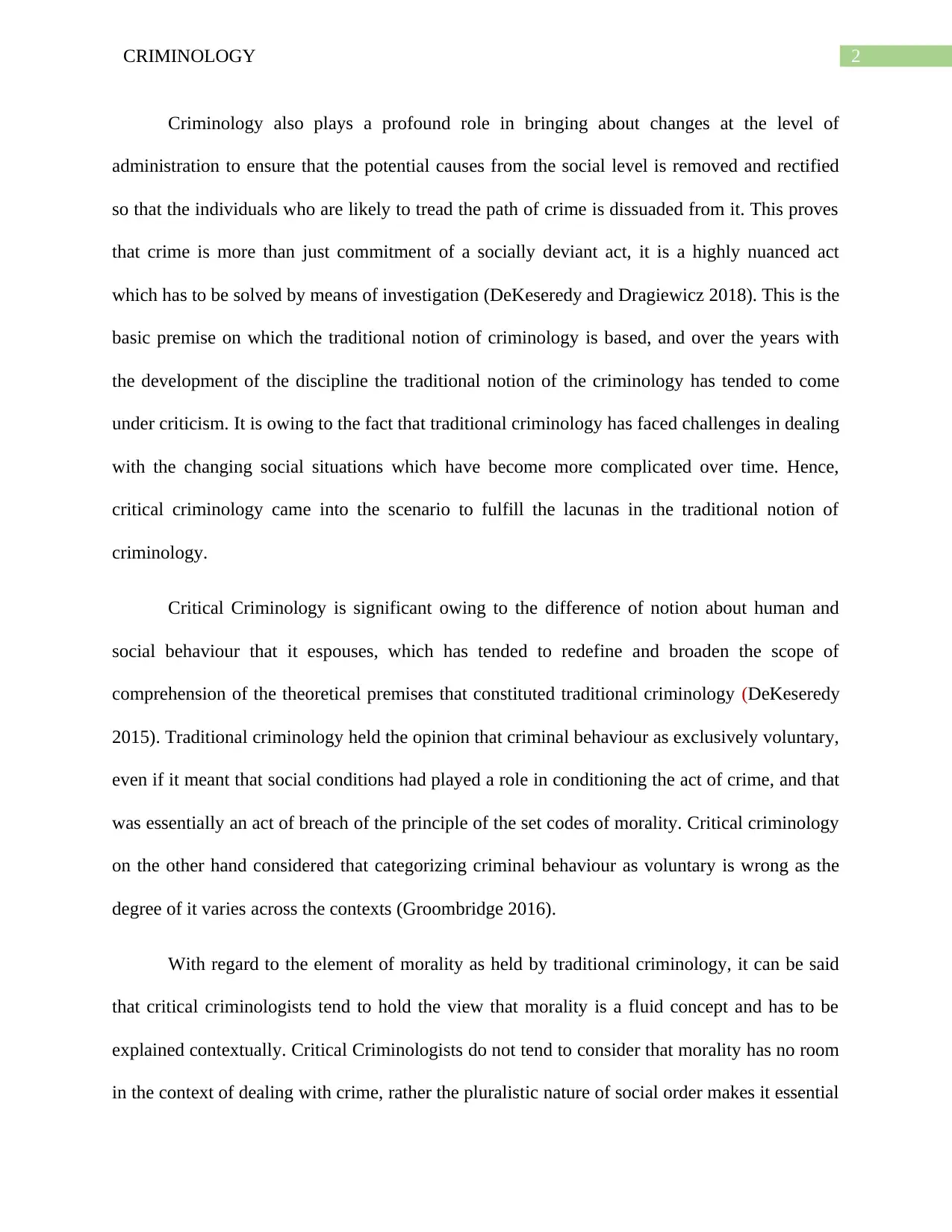
2CRIMINOLOGY
Criminology also plays a profound role in bringing about changes at the level of
administration to ensure that the potential causes from the social level is removed and rectified
so that the individuals who are likely to tread the path of crime is dissuaded from it. This proves
that crime is more than just commitment of a socially deviant act, it is a highly nuanced act
which has to be solved by means of investigation (DeKeseredy and Dragiewicz 2018). This is the
basic premise on which the traditional notion of criminology is based, and over the years with
the development of the discipline the traditional notion of the criminology has tended to come
under criticism. It is owing to the fact that traditional criminology has faced challenges in dealing
with the changing social situations which have become more complicated over time. Hence,
critical criminology came into the scenario to fulfill the lacunas in the traditional notion of
criminology.
Critical Criminology is significant owing to the difference of notion about human and
social behaviour that it espouses, which has tended to redefine and broaden the scope of
comprehension of the theoretical premises that constituted traditional criminology (DeKeseredy
2015). Traditional criminology held the opinion that criminal behaviour as exclusively voluntary,
even if it meant that social conditions had played a role in conditioning the act of crime, and that
was essentially an act of breach of the principle of the set codes of morality. Critical criminology
on the other hand considered that categorizing criminal behaviour as voluntary is wrong as the
degree of it varies across the contexts (Groombridge 2016).
With regard to the element of morality as held by traditional criminology, it can be said
that critical criminologists tend to hold the view that morality is a fluid concept and has to be
explained contextually. Critical Criminologists do not tend to consider that morality has no room
in the context of dealing with crime, rather the pluralistic nature of social order makes it essential
Criminology also plays a profound role in bringing about changes at the level of
administration to ensure that the potential causes from the social level is removed and rectified
so that the individuals who are likely to tread the path of crime is dissuaded from it. This proves
that crime is more than just commitment of a socially deviant act, it is a highly nuanced act
which has to be solved by means of investigation (DeKeseredy and Dragiewicz 2018). This is the
basic premise on which the traditional notion of criminology is based, and over the years with
the development of the discipline the traditional notion of the criminology has tended to come
under criticism. It is owing to the fact that traditional criminology has faced challenges in dealing
with the changing social situations which have become more complicated over time. Hence,
critical criminology came into the scenario to fulfill the lacunas in the traditional notion of
criminology.
Critical Criminology is significant owing to the difference of notion about human and
social behaviour that it espouses, which has tended to redefine and broaden the scope of
comprehension of the theoretical premises that constituted traditional criminology (DeKeseredy
2015). Traditional criminology held the opinion that criminal behaviour as exclusively voluntary,
even if it meant that social conditions had played a role in conditioning the act of crime, and that
was essentially an act of breach of the principle of the set codes of morality. Critical criminology
on the other hand considered that categorizing criminal behaviour as voluntary is wrong as the
degree of it varies across the contexts (Groombridge 2016).
With regard to the element of morality as held by traditional criminology, it can be said
that critical criminologists tend to hold the view that morality is a fluid concept and has to be
explained contextually. Critical Criminologists do not tend to consider that morality has no room
in the context of dealing with crime, rather the pluralistic nature of social order makes it essential
⊘ This is a preview!⊘
Do you want full access?
Subscribe today to unlock all pages.

Trusted by 1+ million students worldwide
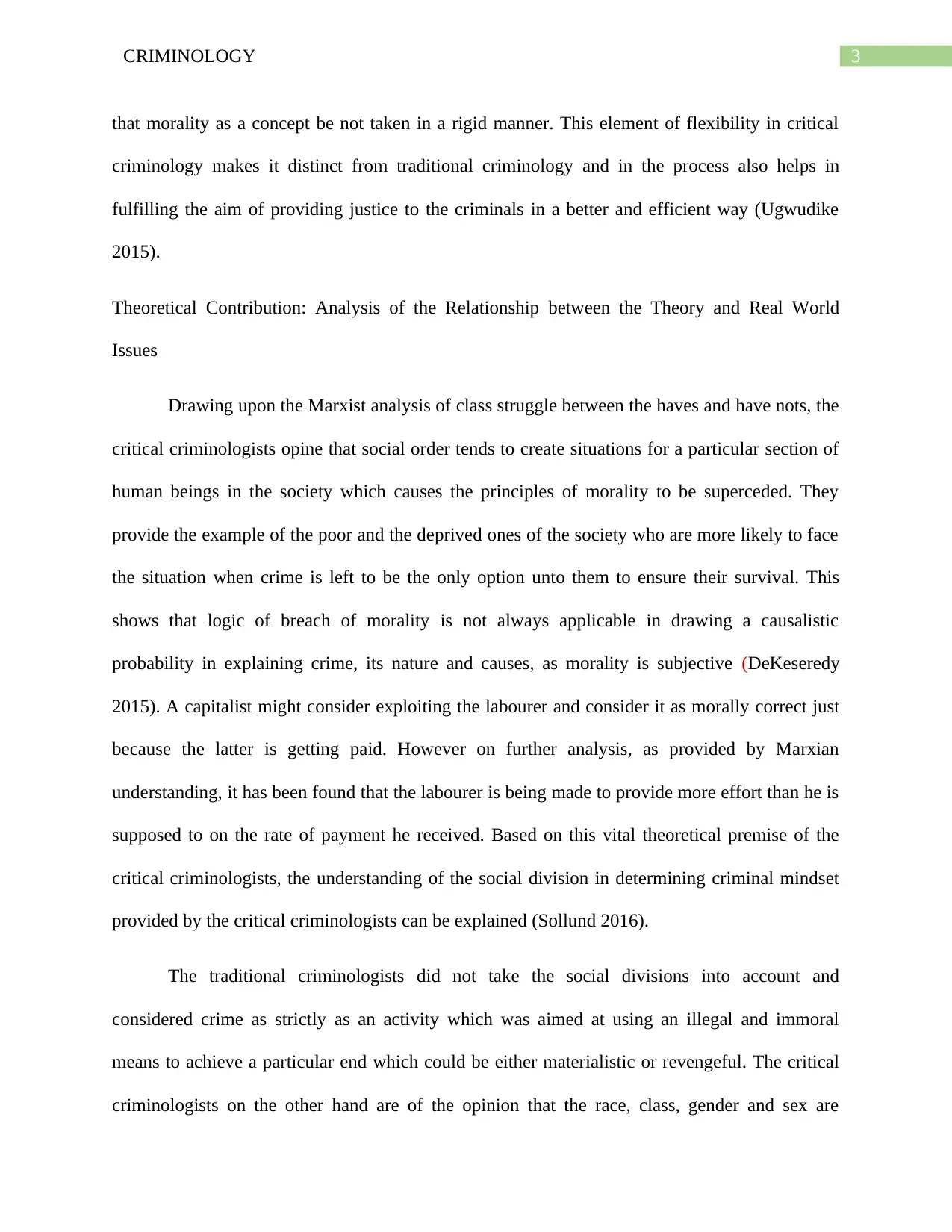
3CRIMINOLOGY
that morality as a concept be not taken in a rigid manner. This element of flexibility in critical
criminology makes it distinct from traditional criminology and in the process also helps in
fulfilling the aim of providing justice to the criminals in a better and efficient way (Ugwudike
2015).
Theoretical Contribution: Analysis of the Relationship between the Theory and Real World
Issues
Drawing upon the Marxist analysis of class struggle between the haves and have nots, the
critical criminologists opine that social order tends to create situations for a particular section of
human beings in the society which causes the principles of morality to be superceded. They
provide the example of the poor and the deprived ones of the society who are more likely to face
the situation when crime is left to be the only option unto them to ensure their survival. This
shows that logic of breach of morality is not always applicable in drawing a causalistic
probability in explaining crime, its nature and causes, as morality is subjective (DeKeseredy
2015). A capitalist might consider exploiting the labourer and consider it as morally correct just
because the latter is getting paid. However on further analysis, as provided by Marxian
understanding, it has been found that the labourer is being made to provide more effort than he is
supposed to on the rate of payment he received. Based on this vital theoretical premise of the
critical criminologists, the understanding of the social division in determining criminal mindset
provided by the critical criminologists can be explained (Sollund 2016).
The traditional criminologists did not take the social divisions into account and
considered crime as strictly as an activity which was aimed at using an illegal and immoral
means to achieve a particular end which could be either materialistic or revengeful. The critical
criminologists on the other hand are of the opinion that the race, class, gender and sex are
that morality as a concept be not taken in a rigid manner. This element of flexibility in critical
criminology makes it distinct from traditional criminology and in the process also helps in
fulfilling the aim of providing justice to the criminals in a better and efficient way (Ugwudike
2015).
Theoretical Contribution: Analysis of the Relationship between the Theory and Real World
Issues
Drawing upon the Marxist analysis of class struggle between the haves and have nots, the
critical criminologists opine that social order tends to create situations for a particular section of
human beings in the society which causes the principles of morality to be superceded. They
provide the example of the poor and the deprived ones of the society who are more likely to face
the situation when crime is left to be the only option unto them to ensure their survival. This
shows that logic of breach of morality is not always applicable in drawing a causalistic
probability in explaining crime, its nature and causes, as morality is subjective (DeKeseredy
2015). A capitalist might consider exploiting the labourer and consider it as morally correct just
because the latter is getting paid. However on further analysis, as provided by Marxian
understanding, it has been found that the labourer is being made to provide more effort than he is
supposed to on the rate of payment he received. Based on this vital theoretical premise of the
critical criminologists, the understanding of the social division in determining criminal mindset
provided by the critical criminologists can be explained (Sollund 2016).
The traditional criminologists did not take the social divisions into account and
considered crime as strictly as an activity which was aimed at using an illegal and immoral
means to achieve a particular end which could be either materialistic or revengeful. The critical
criminologists on the other hand are of the opinion that the race, class, gender and sex are
Paraphrase This Document
Need a fresh take? Get an instant paraphrase of this document with our AI Paraphraser
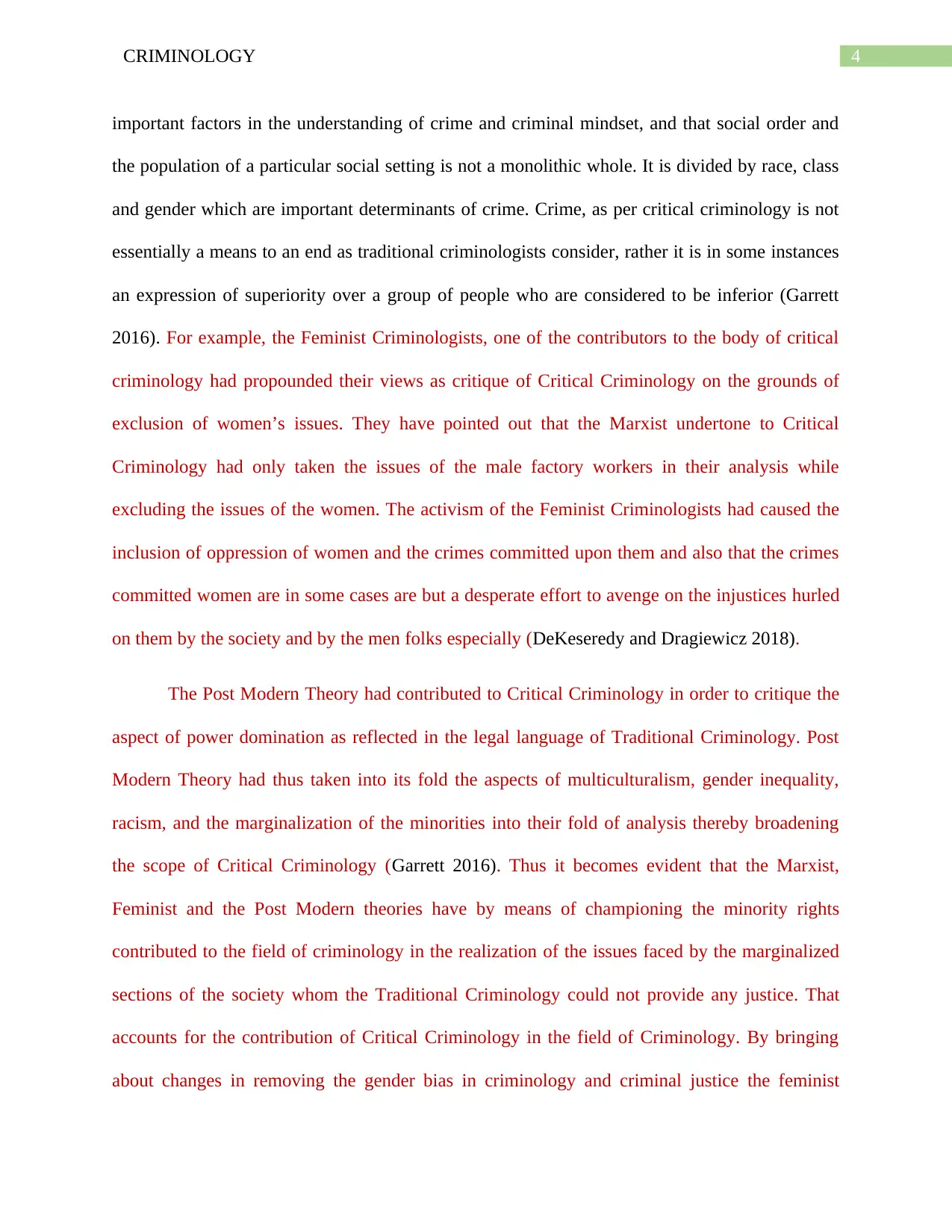
4CRIMINOLOGY
important factors in the understanding of crime and criminal mindset, and that social order and
the population of a particular social setting is not a monolithic whole. It is divided by race, class
and gender which are important determinants of crime. Crime, as per critical criminology is not
essentially a means to an end as traditional criminologists consider, rather it is in some instances
an expression of superiority over a group of people who are considered to be inferior (Garrett
2016). For example, the Feminist Criminologists, one of the contributors to the body of critical
criminology had propounded their views as critique of Critical Criminology on the grounds of
exclusion of women’s issues. They have pointed out that the Marxist undertone to Critical
Criminology had only taken the issues of the male factory workers in their analysis while
excluding the issues of the women. The activism of the Feminist Criminologists had caused the
inclusion of oppression of women and the crimes committed upon them and also that the crimes
committed women are in some cases are but a desperate effort to avenge on the injustices hurled
on them by the society and by the men folks especially (DeKeseredy and Dragiewicz 2018).
The Post Modern Theory had contributed to Critical Criminology in order to critique the
aspect of power domination as reflected in the legal language of Traditional Criminology. Post
Modern Theory had thus taken into its fold the aspects of multiculturalism, gender inequality,
racism, and the marginalization of the minorities into their fold of analysis thereby broadening
the scope of Critical Criminology (Garrett 2016). Thus it becomes evident that the Marxist,
Feminist and the Post Modern theories have by means of championing the minority rights
contributed to the field of criminology in the realization of the issues faced by the marginalized
sections of the society whom the Traditional Criminology could not provide any justice. That
accounts for the contribution of Critical Criminology in the field of Criminology. By bringing
about changes in removing the gender bias in criminology and criminal justice the feminist
important factors in the understanding of crime and criminal mindset, and that social order and
the population of a particular social setting is not a monolithic whole. It is divided by race, class
and gender which are important determinants of crime. Crime, as per critical criminology is not
essentially a means to an end as traditional criminologists consider, rather it is in some instances
an expression of superiority over a group of people who are considered to be inferior (Garrett
2016). For example, the Feminist Criminologists, one of the contributors to the body of critical
criminology had propounded their views as critique of Critical Criminology on the grounds of
exclusion of women’s issues. They have pointed out that the Marxist undertone to Critical
Criminology had only taken the issues of the male factory workers in their analysis while
excluding the issues of the women. The activism of the Feminist Criminologists had caused the
inclusion of oppression of women and the crimes committed upon them and also that the crimes
committed women are in some cases are but a desperate effort to avenge on the injustices hurled
on them by the society and by the men folks especially (DeKeseredy and Dragiewicz 2018).
The Post Modern Theory had contributed to Critical Criminology in order to critique the
aspect of power domination as reflected in the legal language of Traditional Criminology. Post
Modern Theory had thus taken into its fold the aspects of multiculturalism, gender inequality,
racism, and the marginalization of the minorities into their fold of analysis thereby broadening
the scope of Critical Criminology (Garrett 2016). Thus it becomes evident that the Marxist,
Feminist and the Post Modern theories have by means of championing the minority rights
contributed to the field of criminology in the realization of the issues faced by the marginalized
sections of the society whom the Traditional Criminology could not provide any justice. That
accounts for the contribution of Critical Criminology in the field of Criminology. By bringing
about changes in removing the gender bias in criminology and criminal justice the feminist
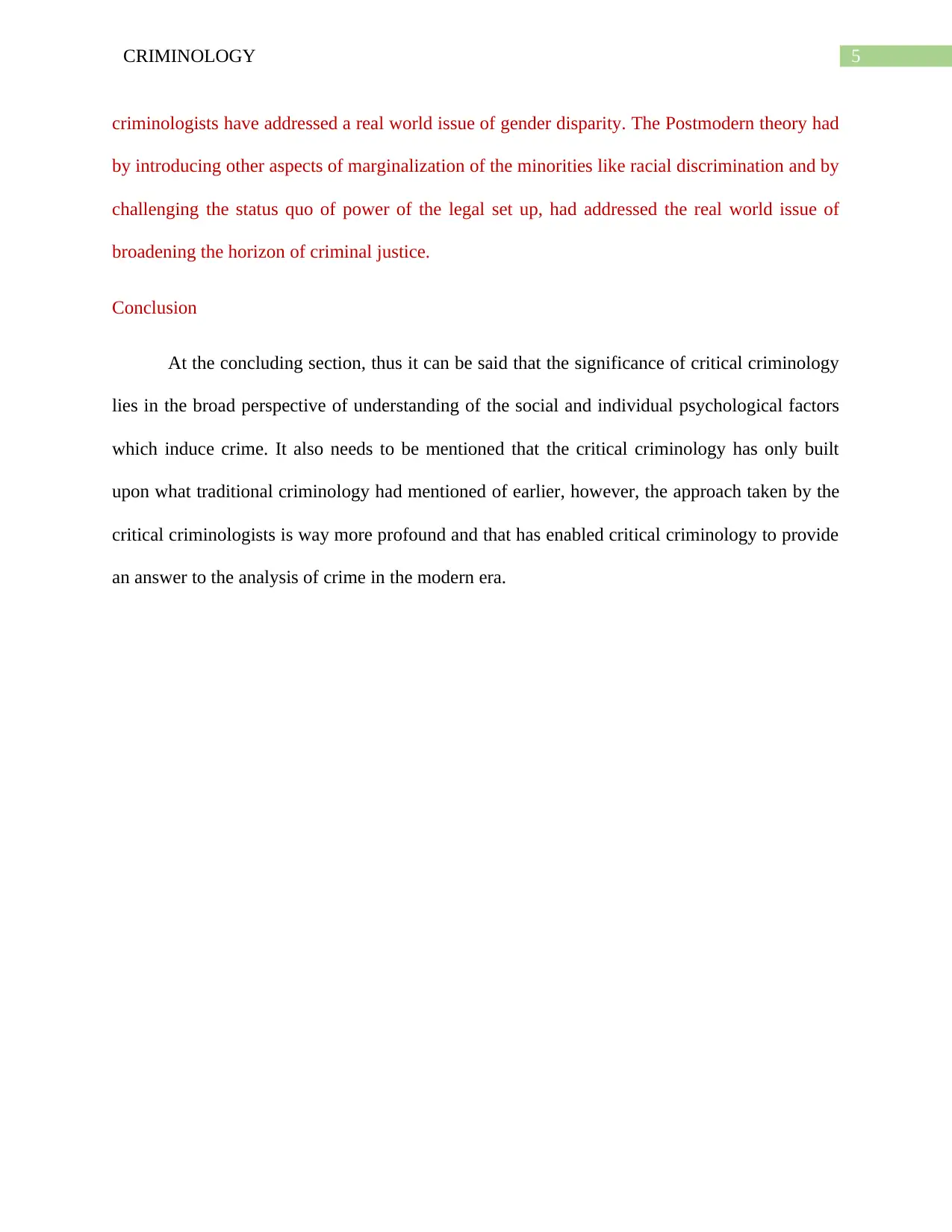
5CRIMINOLOGY
criminologists have addressed a real world issue of gender disparity. The Postmodern theory had
by introducing other aspects of marginalization of the minorities like racial discrimination and by
challenging the status quo of power of the legal set up, had addressed the real world issue of
broadening the horizon of criminal justice.
Conclusion
At the concluding section, thus it can be said that the significance of critical criminology
lies in the broad perspective of understanding of the social and individual psychological factors
which induce crime. It also needs to be mentioned that the critical criminology has only built
upon what traditional criminology had mentioned of earlier, however, the approach taken by the
critical criminologists is way more profound and that has enabled critical criminology to provide
an answer to the analysis of crime in the modern era.
criminologists have addressed a real world issue of gender disparity. The Postmodern theory had
by introducing other aspects of marginalization of the minorities like racial discrimination and by
challenging the status quo of power of the legal set up, had addressed the real world issue of
broadening the horizon of criminal justice.
Conclusion
At the concluding section, thus it can be said that the significance of critical criminology
lies in the broad perspective of understanding of the social and individual psychological factors
which induce crime. It also needs to be mentioned that the critical criminology has only built
upon what traditional criminology had mentioned of earlier, however, the approach taken by the
critical criminologists is way more profound and that has enabled critical criminology to provide
an answer to the analysis of crime in the modern era.
⊘ This is a preview!⊘
Do you want full access?
Subscribe today to unlock all pages.

Trusted by 1+ million students worldwide
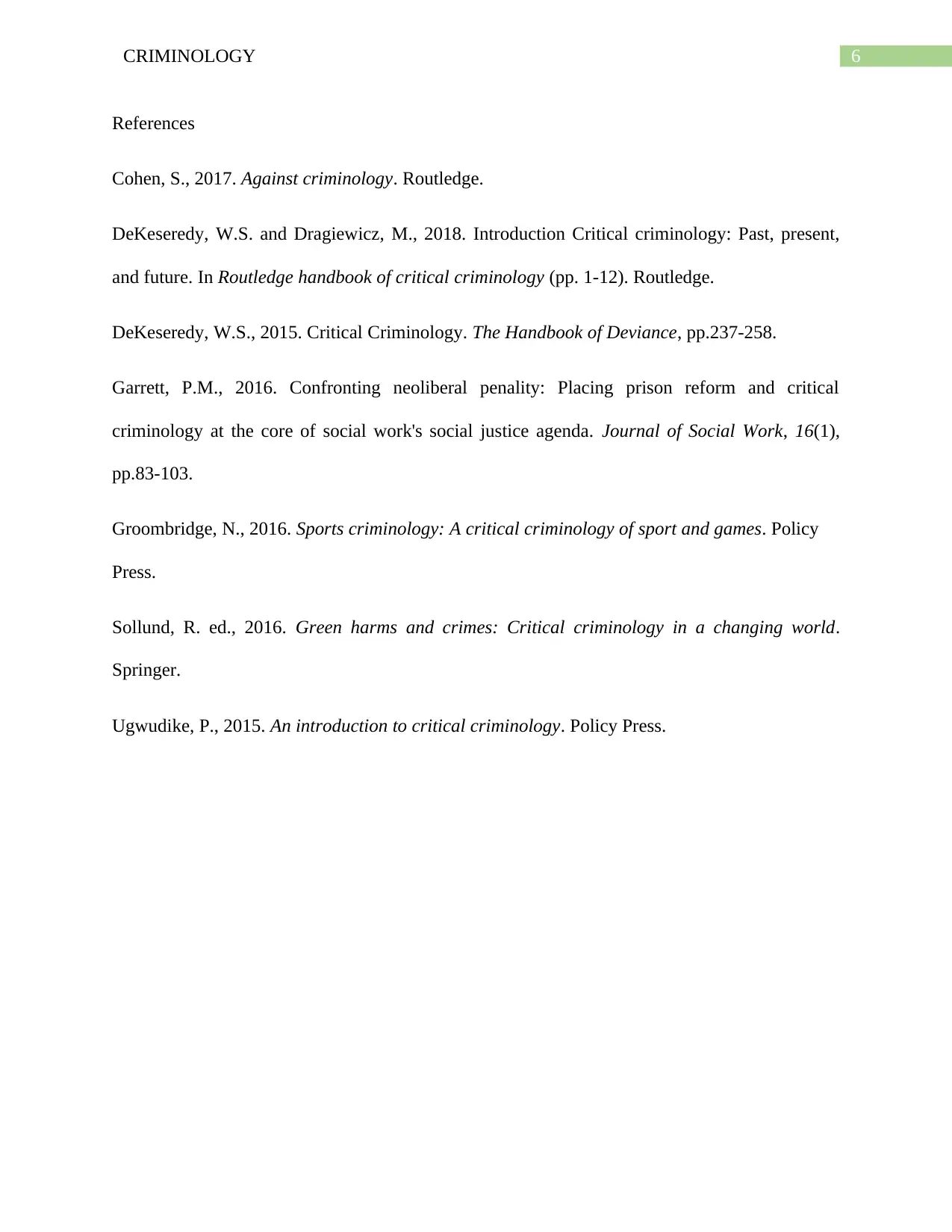
6CRIMINOLOGY
References
Cohen, S., 2017. Against criminology. Routledge.
DeKeseredy, W.S. and Dragiewicz, M., 2018. Introduction Critical criminology: Past, present,
and future. In Routledge handbook of critical criminology (pp. 1-12). Routledge.
DeKeseredy, W.S., 2015. Critical Criminology. The Handbook of Deviance, pp.237-258.
Garrett, P.M., 2016. Confronting neoliberal penality: Placing prison reform and critical
criminology at the core of social work's social justice agenda. Journal of Social Work, 16(1),
pp.83-103.
Groombridge, N., 2016. Sports criminology: A critical criminology of sport and games. Policy
Press.
Sollund, R. ed., 2016. Green harms and crimes: Critical criminology in a changing world.
Springer.
Ugwudike, P., 2015. An introduction to critical criminology. Policy Press.
References
Cohen, S., 2017. Against criminology. Routledge.
DeKeseredy, W.S. and Dragiewicz, M., 2018. Introduction Critical criminology: Past, present,
and future. In Routledge handbook of critical criminology (pp. 1-12). Routledge.
DeKeseredy, W.S., 2015. Critical Criminology. The Handbook of Deviance, pp.237-258.
Garrett, P.M., 2016. Confronting neoliberal penality: Placing prison reform and critical
criminology at the core of social work's social justice agenda. Journal of Social Work, 16(1),
pp.83-103.
Groombridge, N., 2016. Sports criminology: A critical criminology of sport and games. Policy
Press.
Sollund, R. ed., 2016. Green harms and crimes: Critical criminology in a changing world.
Springer.
Ugwudike, P., 2015. An introduction to critical criminology. Policy Press.
1 out of 7
Your All-in-One AI-Powered Toolkit for Academic Success.
+13062052269
info@desklib.com
Available 24*7 on WhatsApp / Email
![[object Object]](/_next/static/media/star-bottom.7253800d.svg)
Unlock your academic potential
Copyright © 2020–2026 A2Z Services. All Rights Reserved. Developed and managed by ZUCOL.